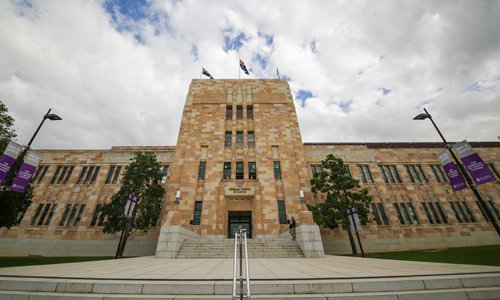Australian university students support anti-China rioter expulsion
By Xu Keyue Source:Globaltimes.cn Published: 2020/4/24 3:13:35

A view of the Australian University of Queensland (UQ) Photo: VCG
Students at the Australian University of Queensland (UQ) said they would support expelling or punishing an anti-China rioter who has allegedly disrupted campus order and incited racism after it was reported the student faces possible expulsion.
Drew Pavlou, a 20-year-old Australian, organized anti-China and secessionist protests connected to China's Hong Kong Special Administrative Region, Xinjiang Uygur Autonomous Region, and the Tibet Autonomous Region. As Pavlou's disciplinary hearing approaches, the possibility of being expelled due to his protest activities, and offensive comments made on social media looms, Australian media reported.
The university has presented 11 allegations of misconduct against Pavlou, including breaching integrity and harassment policies, along with the student charter and he was engaged in intimidating conduct and disrupting campus operations.
According to a statement posted on the school's website, university officials said they had sent Pavlou multiple warnings. And even though he was an elected member of the UQ Senate, he was asked to stop speaking on behalf of the university without authorization.
Pavlou often purported to make statements on behalf of the university when protesting or posting comments on social media, which later harmed the school's reputation.
Chinese and Australian students at UQ contacted by the Global Times expressed their support for the university's possible punishment against Pavlou and felt that expulsion would be reasonable.
A Chinese student, surnamed Yang accused Pavlou of driving a wedge between the mainland and Hong Kong and disrupting campus order.
Another Chinese student, Du Jiafeng, said Pavlou often delivered hate speeches and used Facebook to smear Chinese students, including politicizing their academic behavior, which made Chinese students vulnerable to cyberbullying and discrimination.
Another Chinese student, who requested anonymity, told the Global Times, they had received online and in-person abuse from foreigners on campus during Pavlou's organized protests.
"Some protesters insulted and attacked us, claiming that we were blocking their freedom of speech. But we didn't even get a chance to make our voices heard in local media," said the student.
Australian students also expressed their support for the university. One student encouraged others to start a petition to have Pavlou expelled. "I do not support someone who claims to hold peaceful protests and yet incites violence against another group of people," the student said.
"Worldwide students come here for academic pursuits, and I believe many truly didn't expect such chaos by the protesters," said a foreign netizen on Facebook.
In July 2019, Pavlou organized two protests intended to split China on the university's bustling market day that eventually turned violent. Anti-China protesters asked UQ officials to close its Confucius Institute.
In March, Pavlou hung a sign on a wall at the university's Confucius Institute that said it was a COVID-19 "biohazard" and uploaded a photo of it on Facebook, according to Australian media.
The university later addressed the importance of having an open international collaboration for academia and research. Also, it explained the role of the UQ Confucius Institute, which is "to promote the learning of Chinese language and culture, and a broader understanding of China, at the university and in the community."
In response to Pavlou's accusation against the university's Vice-Chancellor Peter Høj AC regarding his close ties with the China and Confucius Institute, the university said the vice-chancellor had always been transparent about his connections with China and has acted with integrity and autonomy, and in the interest of his employers and Australia.
"Bullying and intimidating behavior, including hate speech, will not be tolerated at UQ," said the university.
RELATED ARTICLES:
Posted in: SOCIETY,CHINA FOCUS